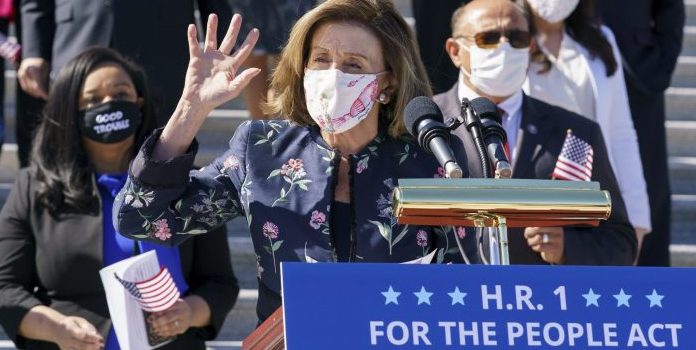(Headline USA) House Democrats passed sweeping voting legislation over unanimous Republican opposition, advancing to the Senate what would be the largest overhaul of the U.S. election law in at least a generation.
House Resolution 1, which touches on virtually every aspect of the electoral process, was approved Wednesday night on a near party-line 220-210 vote. It would restrict partisan gerrymandering of congressional districts and entrench liberalized voting laws without accountability or verification.
Some of the bills most egregious actions, according to the Public Interest Legal Foundation:
- Forces states to implement early voting, automatic voter registration, same-day registration, online voter registration, and no-fault absentee balloting
- Requires states to automatically register all individuals as opposed to “citizens” from state and federal databases
- Mandates no-fault absentee ballots and bans witness signature requirements for absentee ballots
- Force states to accept absentee ballots received up to 10 days after Election Day
- Prevents election officials from checking the eligibility and qualifications of voters and from removing ineligible voters
- Restores the ability of felons to vote
- Transfers the right to draw congressional districts from state legislatures to “independent commissions”
“H.R. 1 should be named the ‘For the Politicians Act,'” said Republican Rep. Doug Lamborn of Colorado. “This massive, 800-page bill would federalize our election system, destroy our First Amendment rights, and completely erode confidence in our election system. Their legislation would legalize ballot harvesting and would force American taxpayers to fund the campaigns of radical Democrats like AOC, Ilhan Omar, and Rashida Tlaib. This bill must never become law.”
It faces an uncertain fate in the Democratic-controlled Senate, where it has little chance of passing without changes to procedural rules that currently allow Republicans to block it.
The stakes in the outcome are monumental, cutting to the foundational idea that one person equals one vote, and carrying with it the potential to shape election outcomes for years to come. It also offers a test of how hard President Joe Biden and his party are willing to fight for their priorities, as well as those of their voters.
This bill “will put a stop at the voter suppression that we’re seeing debated right now,” said Rep. Nikema Williams, a new congresswoman who represents the Georgia district that deceased voting rights champion John Lewis held for years. “This bill is the ‘Good Trouble’ he fought for his entire life.”
To Republicans, however, it would give license to unwanted federal interference in states’ authority to conduct their own elections — ultimately benefiting Democrats through ballot stuffing and unaccountable votes without identity verification.
“Democrats want to use their razor-thin majority not to pass bills to earn voters’ trust, but to ensure they don’t lose more seats in the next election,” House Minority Leader Kevin McCarthy said from the House floor Tuesday.
The measure has been a priority for Democrats since they won their House majority in 2018.
Battle lines are quickly being drawn by outside groups who plan to spend millions of dollars on advertising and outreach campaigns.
Conservatives, meanwhile, are mobilizing a $5 million pressure campaign, urging moderate Senate Democrats to oppose rule changes needed to pass the measure.
“H.R. 1 is not about making elections better,” said Ken Cuccinelli, a former Trump administration Homeland Security official who is leading the effort. “It’s about the opposite. It’s intended to dirty up elections.”
So what’s actually in the bill?
H.R. 1 would require states to automatically register eligible voters, as well as offer same-day registration. It would limit states’ ability to purge inactive, relocated or deceased voters from their rolls and restore former felons’ voting rights. Among dozens of other provisions, it would also require states to offer 15 days of early voting and allow no-excuse absentee balloting.
On the cusp of a once-in-a-decade redrawing of congressional district boundaries, typically a fiercely partisan affair, the bill would mandate that commissions — always appointed by partisans who are in power — to handle the process instead of state legislatures.
The biggest obstacles lie ahead in the Senate, which is split 50-50 between Republicans and Democrats.
On budget- and spending-related legislation, it takes only 51 votes to pass, with Vice President Kamala Harris as the tiebreaker. On bills like this one, they would need 60 votes under the Senate’s rules to overcome a Republican filibuster — a tally they are unlikely to reach.
Some Democrats have discussed options like lowering the threshold to break a filibuster, or creating a workaround that would allow priority legislation, including a separate John Lewis Voting Rights bill, to be exempt. Biden has been cool to filibuster reforms and Democratic congressional aides say the conversations are fluid but underway.
Senate Majority Leader Chuck Schumer has not committed to a time frame but vowed “to figure out the best way to get big, bold action on a whole lot of fronts.”
He said: “We’re not going to be the legislative graveyard. … People are going to be forced to vote on them, yes or no, on a whole lot of very important and serious issues.”
Adapted from reporting by Associated Press.

